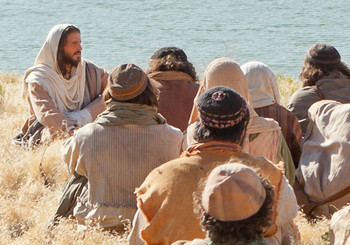Christian living requires work, lots of sacrifice, discipline and love. It's not easy to be poor, to be merciful, to be meek, to be peacemakers, to hunger and thirst for justice. It requires courage to be persecuted and ridiculed and mocked for being authentic Christians, for being Christ-like. It takes faith and trust in God to admit our own weaknesses and dependence upon one another rather than looking at each other's faults. It takes heroic love.
 Today, we listen to the beginning of Luke's account of the "Sermon on the Plain," consisting of blessings and woes that address the real economic and social conditions of humanity (the poor - the rich; the hungry - the satisfied; those grieving - those laughing; the outcast - the socially acceptable). By contrast, the "Sermon on the Mount" found in Matthew emphasizes the religious and spiritual values of disciples called to the kingdom by Jesus ("poor in spirit," "hunger and thirst for righteousness,").
Today, we listen to the beginning of Luke's account of the "Sermon on the Plain," consisting of blessings and woes that address the real economic and social conditions of humanity (the poor - the rich; the hungry - the satisfied; those grieving - those laughing; the outcast - the socially acceptable). By contrast, the "Sermon on the Mount" found in Matthew emphasizes the religious and spiritual values of disciples called to the kingdom by Jesus ("poor in spirit," "hunger and thirst for righteousness,").
Luke deals with real people in their real-life, day-to-day experiences.
The quality or value of any sermon is only measured by the effect it has on the lives of those who hear it, and on the community of the human family. Keeping the commandments of God, and living according to the Gospel of Jesus is not just a matter of personal holiness or of intellectual or spiritual values. Jesus expects his disciples to share his message with real people every day and in every circumstance. If we are redeemed and sanctified by the life, death and resurrection of Jesus, then we, too, are sent by Him to redeem and sanctify our world in His name.
Immediately after listing the "beatitudes," characteristics that identify His followers, Jesus spells out their mission in the world. Continuing the sermon in next week's Gospel, Jesus says: "To you who hear I say love your enemies, do good to those who hate you, bless those who curse you, pray for those who mistreat you." Once again, we are challenged not only to follow the Gospel in our own lives, but also to be living witnesses of the Good News for all we encounter on life's journey.
How exactly are we to do this? He says: "share your bread with the hungry, shelter the oppressed and the homeless, clothe the naked,stop condemning and you will not be condemned, forgive and you will be forgiven, give and gifts will be given to you." But woe to you who do not!
The Beatitudes are to be lived, not just listened to. We can't just be satisfied with memorizing these words. We can't just keep them handy in a notebook that we can occasionally refer to. We can't just give them lip-service. We can't just preach them to our children and to our neighbors.
The heart of Jesus' message is that our love is to be "inclusive" - all-inclusive, with no exception. That is probably the most difficult thing about being an authentic Christian. Living the Gospel is a constant challenge. Almost naturally, instinctively, our love and our concern tend to be exclusive. We are comfortable with people who are like us, in color, ethnicity, religion, and economic status. We find it easy to be good to those who like us, those who are attentive to us, those who understand us. But it is very clear that he wants us to exclude no one from our love - not the beggar, the borrower, the adulteress, the leper, the widow, the poor, the orphan, the enemy. Each of us can make our own list of the "most unwanted" - those whom we find most difficult to forgive, to feel sympathy for, to offer compassion to.
Jesus tells us that it makes no difference.




